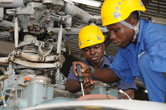Rivers State: The making of an island of integrity

Uche Igwe travels to Rivers State in Nigeria and reports on progressive reforms by the state governor in the areas of healthcare, education and food security.
Travelling across the old eastern region of Nigeria can be very challenging. The roads are just very bad. There are also thousands of police checkpoints. You meet one literally every one two minutes. Sometimes you fear for your dear life because you may not know whether the next roadblock has been mounted by the police or dare devil kidnappers.
From Owerri and then to Aba you seem to have suddenly enrolled for a dancing exercise. Across your window, you are greeted by heaps of decaying refuse. It will only be safe to assume that you have entered an area forgotten by government unless you want to give yourself a heartache. That was my experience a month ago.
However, as you continue along the Aba-Port Harcourt expressway, a different kind of air will start blowing at some point. You will then start seeing well built bus stations, feeder roads and street lights. Hey, what happened? Just know that you have entered Rivers State.
A MASSIVE CONSTRUCTION SITE
The government of Rivers State has recently turned Port Harcourt city into a massive construction site. Diverse forms of construction are going on and that only reminds me of Doha, the capital of Qatar that I visited many years ago. From roads, to bridges, to street lights to mono rail. There is a clear hurry to develop the state. I went around the city and spoke to at least 55 ordinary people: from drivers to petty traders, everyone acknowledged the speedy pace of infrastructural development that has indeed given Port Harcourt a very impressive look.
SYSTEMATIC DEVELOPMENTAL APPROACH
I found out that as soon as the administration of Rivers State governor Rotimi Amaechi took over three years ago, the governor undertook a retreat with his appointees and unveiled a development strategy. This strategy, I was told, was to pave a way towards the non-oil economy by providing quantum infrastructure in the state and achieving food security.
In the difficult terrain of the Niger Delta, this will seem to be a tall and even impossible ambition, but the evidence on the ground will become so overwhelming that one will only wonder if all of this was achieved in just three years. Apart from the free compulsory primary education and health care, the state government is building 60 brand new health centres, which will be commissioned soon. It is also noteworthy that human capital development is a big priority in the state. Many indigenes of Rivers State are currently studying in several universities around the world under the state overseas scholarship scheme. Other schemes like the Greater Horizon and Opportunities Program (GHOP) and the compulsory Graduate Work Experience Placement Scheme (GWEPS) is indicative of a government that understands the priorities of the people and has a clear focus in addressing them.
One of the major agro-allied initiatives of the Rivers State government is the Songhai Rivers Initiative. This is an initiative that is aimed at promoting agricultural and allied productivity to generate employment and diversify the economy of Rivers State. This singular project had been judged by many as the most visionary project ever to be embarked upon by any state governor in Nigeria. When completed, the Songhai Initiative is expected to generate about a hundred thousand jobs and millions of naira daily for government. It is modeled after the Songhai farms in Port Novo in the Benin Republic, which is generating billions of dollars annually at the moment.
TRANSPARENCY AND THE RAINY DAY FUND
What is seen as the most outstanding achievement of the Rivers State government is the setting aside of a compulsory 27 billion naira as a ‘rainy day fund’ for future generations. This amount of money will be invested for future generations in Rivers State. Governor Amaechi is blazing the trail and has already signed an agreement with a consortium of sound money managers to invest the funds, all in a committed effort to make Rivers State money benefit the people.
On the occasion of the third year anniversary of his assumption to duty as governor, Amaechi published the amounts of all the monies the state has received, the entire list of contracts awarded and all the stages of the projects, including verifiable figures. This is a rare show of transparency and stewardship that should be emulated by other public office holders.
DEVELOPMENT BACKED BY LAW
As a former lawmaker himself, Governor Amaechi understands that the only way to guarantee the reforms he has introduced is to codify them by law. The education and heath care reforms as well as the rainy day funds have been backed by appropriate legislation. This legislation were carefully crafted to insulate these progressive policies from the virus of political manipulation and reversal.
In all, the innovative reforms and the infrastructural boost in Rivers State are commendable. Oil is a non-renewable resource that will dry up one day. We must diversify our state and national economy beyond oil by building a solid infrastructural base. Rotimi Chibuike Ameachi is leading the way. Other governors in the Niger Delta and indeed the old south-eastern Nigeria should emulate his example. Who says sustainable development is not possible in our lifetime?
BROUGHT TO YOU BY PAMBAZUKA NEWS
* Uche Igwe is a researcher at the Africa Program, Johns Hopkins University, Washington DC.
* Please send comments to [email protected] or comment online at Pambazuka News.
